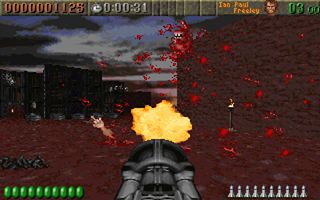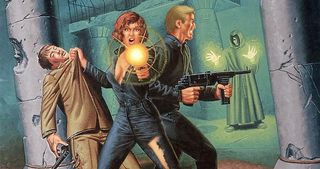Great moments in PC gaming: The 'ludicrous gibs' of Rise of the Triad
Eyeballs. Spines. The '90s.

Great moments in PC gaming are bite-sized celebrations of some of our favorite gaming memories.

Developer: Apogee Software
Year: 1994 (shareware release) 1995 (full version)
The 1990s were a good time for videogame gore. If you really wanted to see some spinal cords being removed, games had you covered. Two years after Mortal Kombat and one year after Doom, Rise of the Triad was a particularly memorable example of the artform that is making red stuff come out of people in entertaining ways.
Apogee had been working on a sequel to Wolfenstein 3D. When the project was canceled, it left them with a bunch of first-person shooter assets. They built Rise of the Triad (later renamed Rise of the Triad: Dark War to differentiate it from a remake) on those bones, improving on Wolfenstein in a bunch of ways—especially the scale of their game's destructibility. Glass shattered, bulletholes persisted, and various bits of level scenery like plants and lights broke.
The most impressive destruction was that visited on the enemies, who popped into red smears. Hit them with a rocket and they were reduced to spinning offal: an eyeball; a severed hand that gave the finger as it passed; a skull with some of that attached spinal cord the '90s was all about.
Accompanying this carnage was the message "Ludicrous Gibs!" because 'gibs' was apparently short for giblets at Apogee. This internal studio slang would go on to be referenced by Quake and become a lasting bit of videogame lore.
It may not seem like much today, but the first time an eyeball slid down your screen it was pretty special. What a time to be alive.

The biggest gaming news, reviews and hardware deals
Keep up to date with the most important stories and the best deals, as picked by the PC Gamer team.

Jody's first computer was a Commodore 64, so he remembers having to use a code wheel to play Pool of Radiance. A former music journalist who interviewed everyone from Giorgio Moroder to Trent Reznor, Jody also co-hosted Australia's first radio show about videogames, Zed Games. He's written for Rock Paper Shotgun, The Big Issue, GamesRadar, Zam, Glixel, Five Out of Ten Magazine, and Playboy.com, whose cheques with the bunny logo made for fun conversations at the bank. Jody's first article for PC Gamer was about the audio of Alien Isolation, published in 2015, and since then he's written about why Silent Hill belongs on PC, why Recettear: An Item Shop's Tale is the best fantasy shopkeeper tycoon game, and how weird Lost Ark can get. Jody edited PC Gamer Indie from 2017 to 2018, and he eventually lived up to his promise to play every Warhammer videogame.
Most Popular

